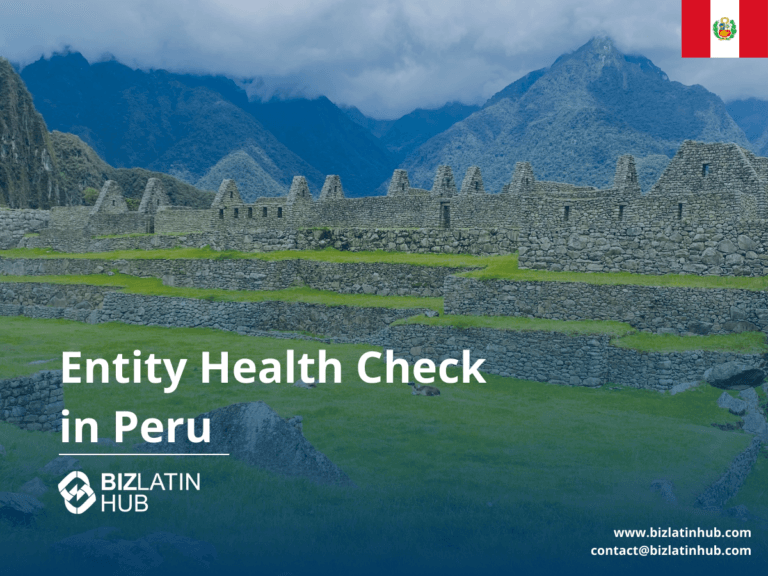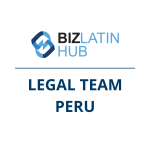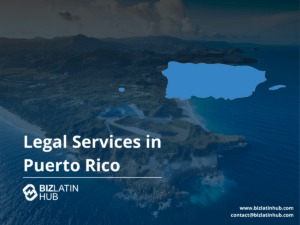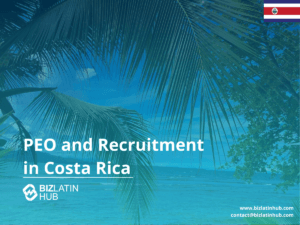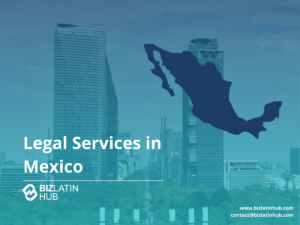Conducting an entity health check in Peru protects your business from compliance risks and penalties. Peru’s regulatory framework requires companies to maintain strict corporate compliance, making regular due diligence Peru assessments essential for business success.
Entity health checks serve as comprehensive corporate due diligence Peru processes that verify your company meets all legal requirements. Whether you need legal due diligence Peru services or a Peru compliance check, understanding these requirements helps avoid costly penalties and operational disruptions.
Key Takeaways on Entity Health Check in Peru
| Topic | Key Information |
|---|---|
| Main compliance areas | Corporate registry, SUNAT tax obligations, labor law compliance, data protection (Law 29733), sector licenses |
| Critical deadlines | Annual tax returns (varies by type), Monthly PDT filings (date depends on RUC), Registry updates (varies by change) |
| Who needs health checks | All companies operating in Peru, particularly those with complex operations, foreign ownership, or M&A activity |
| Frequency recommended | Annual reviews standard, quarterly for mining/banking/telecom sectors, monthly monitoring for high-risk areas |
| Common violations | Late SUNAT filings, outdated SUNARP records, missing labor registrations, incomplete prevention models (Law 30424) |
| Cost-saving tip | Combine health checks with regular compliance activities to reduce overall professional service costs |
Why Entity Health Checks Matter for Peru Operations
Peru compliance check procedures protect businesses from severe penalties including temporary closure, permanent closure, and criminal liability under Law 30424. Companies operating in Peru face unique regulatory challenges that require specialized Peru entity verification processes.
Risk Mitigation Through Due Diligence Peru
Regular corporate due diligence Peru assessments identify compliance gaps before they become costly problems. Peru’s regulatory authorities maintain active monitoring programs that can catch non-compliance quickly. SUNAT, the tax authority, imposes significant penalties for tax violations that vary based on the type and severity of non-compliance. SUNAFIL, the labor authority, can issue substantial fines for labor law violations, with amounts determined by factors including company size and violation severity. Companies also face criminal liability under Law 30424 for corruption and money laundering activities, and contracts may become invalid if not properly registered.
The interconnected nature of Peru’s regulatory system means that a violation in one area often triggers reviews in others. For example, a SUNAT tax audit frequently leads to SUNAFIL labor inspections, making comprehensive compliance essential for business continuity.
Prevention Law 30424: Peru’s Corporate Criminal Liability Framework
Law 30424 establishes corporate criminal liability in Peru, making companies directly responsible for crimes committed by employees unless they implement certified prevention models. This legislation fundamentally changed how businesses approach legal due diligence Peru, requiring proactive compliance measures rather than reactive responses.
The prevention model must include comprehensive compliance elements:
Required components:
- Risk identification and evaluation specific to Peru operations
- Prevention officer registered with the Ministry of Justice
- Internal whistleblower channels (mandatory since 2019)
- Quarterly training documentation
- Annual model certification
- Sector-specific protocols (mining, construction, public contracting)
- Integration with business processes
- Internal audit procedures
- Continuous improvement documentation
Peru Expert Tip: Register your prevention model with the SMV (Securities Market Superintendency) if you plan public contracting. This registration, while voluntary, provides legal advantages and demonstrates commitment to compliance. Companies with registered models often receive more favorable treatment during investigations and may qualify for reduced penalties if violations occur despite good faith compliance efforts.
Types of Entity Health Checks in Peru
Fiscal Entity Health Check
Fiscal due diligence Peru focuses on comprehensive tax compliance with SUNAT requirements. Monthly obligations form the backbone of fiscal compliance:
Monthly requirements:
- PDT (Programa de Declaración Telemática) filings according to tax calendar
- IGV sales tax declarations with supporting documentation
- Income tax withholdings for employees and suppliers
- Electronic invoicing compliance and sequential numbering
These monthly requirements connect to annual obligations such as corporate income tax at the current 29.5% rate, annual sworn declarations, transfer pricing documentation for related party transactions, and validation of tax loss carryforwards.
Peru’s tax system operates on strict deadlines that companies must monitor carefully. PDT 621 for IGV must be filed by the 15th of each month through SUNAT’s SOL system. Electronic books require updates within three months of transactions, and companies engaging in international transactions should request tax residence certificates to access treaty benefits. Missing these deadlines triggers automatic penalties and interest charges that compound quickly.
Legal Due Diligence Peru
Legal entity health checks examine corporate structure and regulatory compliance across multiple government agencies. SUNARP, the public registry, requires current corporate bylaws, updated board appointments, registered capital modifications, and proper branch registrations. Any changes to corporate structure must be registered within specific timeframes to maintain legal validity.
Labor compliance through SUNAFIL represents another critical area. Companies must maintain T-REGISTRO employee registrations, file PLAME payroll declarations monthly, establish workplace safety committees for operations with 20 or more employees, and calculate profit sharing correctly based on sector-specific requirements. Mining, fishing, and telecommunications companies face additional profit-sharing obligations that require careful calculation and distribution.
Sector-specific licenses add another layer of complexity. Mining operations need MINEM operational permits, banks require SBS authorization, telecommunications companies must obtain MTC concessions, and healthcare providers need MINSA sanitary registry approval. Each license type has unique renewal requirements and compliance obligations that entity health checks must verify.
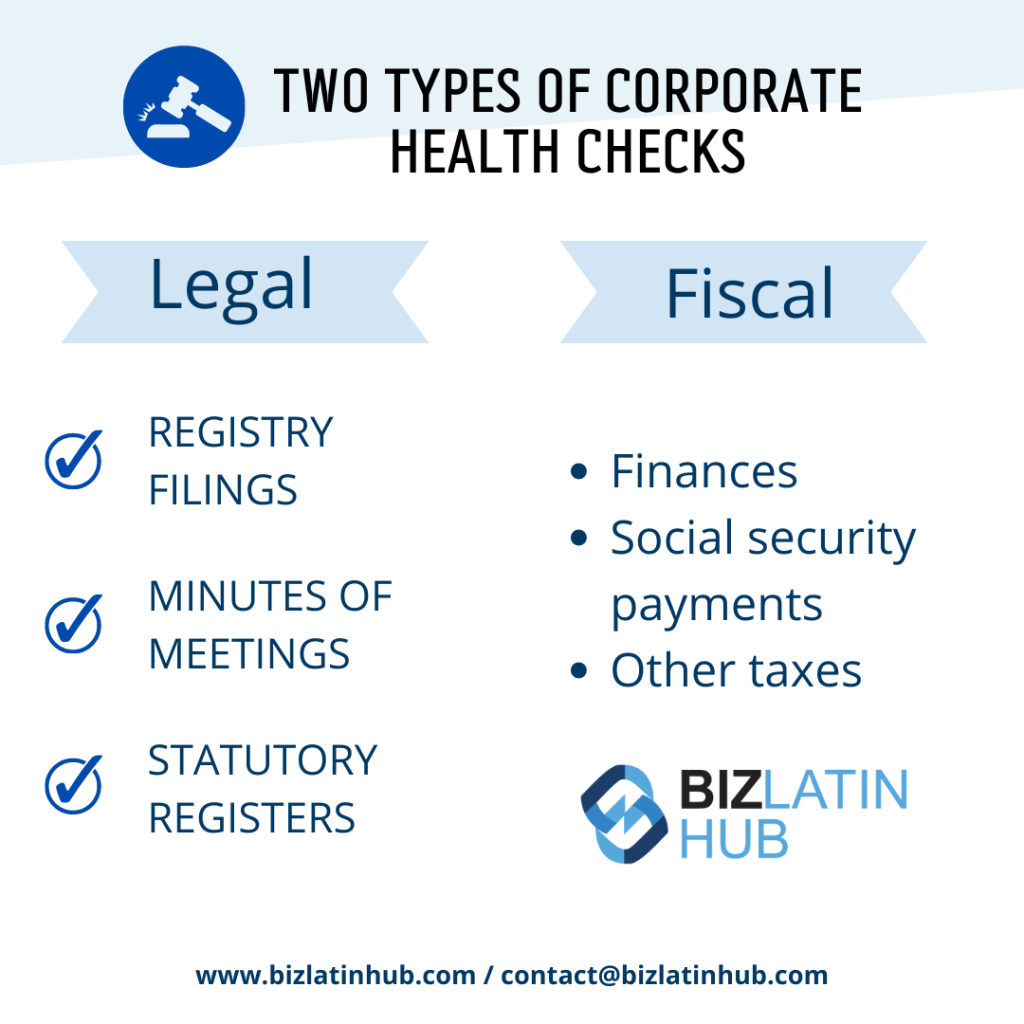
Who Benefits from Peru Entity Verification
Foreign Investors
International companies establishing Peru operations face unique challenges that make comprehensive Peru compliance checks essential. The permanent establishment rules create tax obligations after 183 days of presence in Peru, while thin capitalization limits restrict debt-equity ratios to 3:1. Controlled Foreign Corporation rules and economic substance requirements add additional complexity that requires expert navigation to ensure compliant structuring from the outset.
Foreign investors often underestimate the documentation requirements for Peru operations. Every transaction requires proper support, and tax authorities expect detailed transfer pricing documentation for all related party dealings. Entity health checks help foreign investors understand these requirements before they result in costly penalties or operational restrictions.
Mergers and Acquisitions
M&A transactions demand thorough corporate due diligence Peru processes to uncover hidden risks. SUNAT maintains four-year audit rights that can reveal historical tax contingencies long after transactions close. Acquirers face solidarity liability for labor obligations, meaning they inherit any unpaid benefits or violations from previous owners. Environmental remediation obligations, unregistered intellectual property, and pending administrative proceedings represent additional risks that only comprehensive due diligence can reveal.
The complexity of Peru’s regulatory environment makes professional entity health checks essential for accurate business valuations. Hidden liabilities can significantly impact transaction values, and early identification allows for proper negotiation and risk allocation between parties.
Startups and SMEs
New businesses benefit significantly from establishing compliant structures early in their development. Peru entity verification helps entrepreneurs choose the optimal legal structure among SAC, SRL, or branch options based on their specific needs. Early trademark registration with INDECOPI protects intellectual property, while properly structured employment contracts ensure compliance with Legislative Decree 728. Implementation of data protection protocols under Law 29733 becomes increasingly important as businesses collect customer information.
Peru Expert Tip: Startups should prioritize establishing a virtual data room using Peru-compliant platforms from day one. SUNAT accepts electronic documentation, which reduces physical storage requirements and simplifies future audits. This digital-first approach also facilitates faster entity health checks and due diligence processes as the business grows.
Comprehensive Entity Health Check Process
1. Information Collection Phase
The information collection phase requires systematic gathering of documentation across all business departments. Corporate documents form the foundation, including SUNARP registration certificates, board meeting minutes from the last two years, shareholder agreements, and power of attorney registrations. Each document must be current and properly executed to provide accurate assessment results.
Financial records require particular attention during collection. All SUNAT tax filings (PDTs), electronic accounting books, bank reconciliations, and intercompany agreements must be compiled and organized. The electronic format requirements in Peru mean that many documents exist only in digital form, requiring secure collection and storage protocols.
Operational compliance documentation spans employment contracts, supplier agreements, customer contracts, and insurance policies. These documents often reveal compliance gaps in standard terms, payment schedules, and liability allocations that impact overall business risk.
2. Validation and Verification
Validation processes cross-reference collected documentation against official government databases. SUNAT’s online verification system confirms tax filing status and payment history, while SUNARP public registry validates corporate structure and registered modifications. ESSALUD contribution records verify social security compliance, and sector-specific ministry databases confirm license validity and compliance status.
This verification stage often reveals discrepancies between internal records and official registrations. Common issues include outdated addresses in official registries, unregistered board changes, and mismatches between declared and actual business activities. Each discrepancy requires investigation to determine the cause and appropriate remediation.
3. Gap Analysis and Remediation
Gap analysis prioritizes identified issues based on risk level and remediation complexity:
High priority (immediate action required):
- Overdue tax filings with SUNAT
- Unregistered employees in T-REGISTRO
- Expired operational licenses
- Missing Law 30424 prevention model elements
Medium priority (30-day timeline):
- Commercial contract updates
- SUNARP registry modifications
- Internal policy implementations
- Employee training programs
Low priority (90-day timeline):
- Process optimization initiatives
- System integration improvements
- Documentation standardization
This structured approach ensures critical compliance issues receive immediate attention while planning systematic improvements for long-term efficiency.
Local Expert Recommendations for Peru Compliance
Tax Optimization Strategies
Peru’s tax system offers several optimization opportunities for compliant businesses. The advance tax ruling system allows companies to request binding rulings from SUNAT for complex transactions, providing certainty before implementation. Tax stability agreements remain available for mining and large infrastructure projects, offering protection against future tax increases. Companies conducting research can claim up to 175% deduction for qualified R&D expenses, while free zones in Tacna, Ilo, and Matarani provide customs and tax benefits for eligible operations.
Understanding these opportunities requires deep knowledge of Peru’s tax code and SUNAT’s interpretation practices. Entity health checks identify applicable benefits and ensure companies meet qualification requirements to access these advantages.
Labor Law Compliance Tips
Peru’s labor laws contain unique requirements that surprise many foreign companies. Profit sharing obligations require distribution of 5-10% of pre-tax profits depending on the sector, with specific calculation methods for each industry. Vacation scheduling rules mandate that employees take earned vacation within 12 months, creating administrative challenges for HR departments. CTS (Compensation for Time of Service) deposits must occur semi-annually in May and November to designated employee accounts, while gratification payments in July and December require an additional 9% contribution.
These obligations interconnect with tax and social security requirements, making integrated compliance essential. Entity health checks verify correct calculations and timely deposits while identifying opportunities to optimize these mandatory benefits.
Corporate Governance Best Practices
Effective corporate governance in Peru requires understanding local requirements and cultural expectations. Board meetings should occur within Peru to maintain tax residence, with proper documentation of attendance and decisions. Digital signatures from qualified certificate providers streamline document execution while maintaining legal validity. Shareholder rights include 48-hour meeting notice requirements and broad information access that companies must respect. Related party transactions require arm’s length documentation through transfer pricing studies to satisfy tax authorities.
These governance requirements impact daily operations and strategic decision-making. Regular entity health checks ensure governance practices align with regulatory expectations while supporting business objectives.
Industry-Specific Compliance Requirements
Different industries face unique compliance obligations in Peru that standard entity health checks must address. Mining companies must maintain current Environmental Impact Assessments, community relations agreements, closure plan guarantees, and complex canon and royalty calculations. Financial services providers navigate SBS reporting requirements, anti-money laundering protocols, customer identification procedures, and capital adequacy maintenance obligations. Manufacturing operations require DIGESA sanitary permits, OSINERGMIN safety certificates, environmental compliance with OEFA standards, and various import/export licenses.
Each sector’s requirements evolve with new regulations and enforcement priorities. Industry-specific entity health checks incorporate these specialized requirements to provide comprehensive compliance assessment.
Cost-Benefit Analysis of Regular Health Checks
Investment in prevention through regular entity health checks provides significant return through risk mitigation. Annual comprehensive health checks typically cost between S/ 15,000 and S/ 50,000 depending on company size and complexity. Quarterly monitoring services range from S/ 5,000 to S/ 15,000, while compliance software solutions cost S/ 500 to S/ 2,000 monthly.
These investments pale compared to potential penalties and losses from non-compliance. SUNAT penalties alone can range from S/ 50,000 to S/ 500,000, while SUNAFIL fines reach S/ 20,000 to S/ 1,000,000. Legal disputes often exceed S/ 100,000 in direct costs, not counting business disruption. Most importantly, maintaining business continuity through compliance provides invaluable protection for company value and reputation.
FAQs on Entity Health Check in Peru
How often should we conduct entity health checks in Peru?
Conduct annual health checks at a minimum. High-risk sectors like mining, banking, and construction should conduct quarterly assessments, while monthly monitoring is recommended for tax compliance and labor obligations due to frequent filings and penalty risks.
Can we perform entity health checks internally?
Yes, internal reviews are useful for ongoing monitoring, but independent auditors provide objectivity and expertise. Some areas, like tax and financial reporting, may require certified professionals under Peruvian law. Combining internal checks with annual external audits is the most effective strategy.
What documents must we maintain for Peru compliance?
Companies must maintain corporate books, tax records for five years, employment files, contracts, licenses, and prevention model documentation. Electronic records are acceptable if in SUNAT-approved formats with proper backups. Retention policies should reflect the different legal timeframes for each document type.
How long does a comprehensive entity health check take?
Entity health checks typically take 2–4 weeks depending on company size and document readiness. Multinational or complex businesses may need 6–8 weeks. M&A-driven checks can be completed in 1–2 weeks with larger teams and expedited services.
What happens if we discover non-compliance?
Immediate remediation should be planned, including filing corrective declarations with SUNAT, updating registries, and obtaining necessary permits. Voluntary disclosures often reduce penalties compared to discovery during inspections. Keep documentation of all corrective actions taken.
Are entity health checks mandatory in Peru?
No, health checks are not legally mandatory. However, they help ensure compliance with required regulations. Listed companies and regulated sectors have audit obligations that often align with health check procedures. Law 30424 also requires periodic reviews of prevention models for certification.
How do we select qualified auditors in Peru?
Choose firms registered with the College of Public Accountants of Peru. Verify their industry-specific experience and up-to-date regulatory knowledge. Request references and sample reports to evaluate quality. Strong auditors combine technical skills with a practical understanding of business operations.
Conclusion: Protecting Your Peru Investment
Entity health checks provide essential protection for businesses operating in Peru’s complex regulatory environment. Regular corporate due diligence Peru assessments identify risks before they become expensive problems, while professional legal due diligence Peru reviews ensure comprehensive coverage of all compliance areas. Whether conducting focused Peru compliance checks or comprehensive Peru entity verification processes, professional guidance ensures thorough assessment and practical remediation strategies.
Peru’s growing economy offers significant opportunities for prepared businesses. Proper prevention models, updated registrations, and compliant operations position companies for sustainable growth while avoiding costly penalties and reputational damage. The investment in regular entity health checks pays dividends through operational stability and business continuity.
Take Action Today: Schedule your entity health check to ensure full compliance with Peru regulations. Protect your business from penalties and position for sustainable growth in the Andean market.

